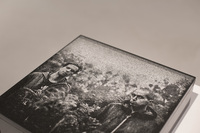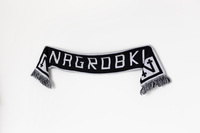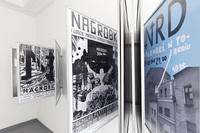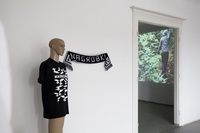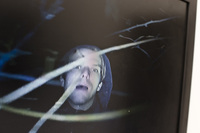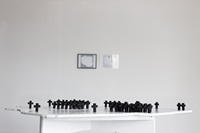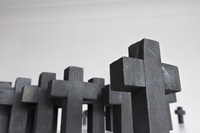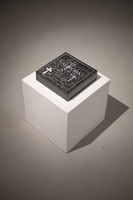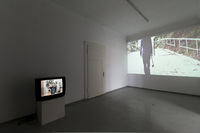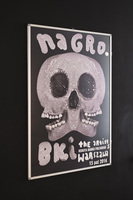Wherever I Will Be, There Will Be Death! is an exhibition of the cult music band Nagrobki, which comprises visual artists and musicians – Maciej Salamon and Adam Witkowski. During the opening on the eve of the premiere of their new record Nagrobki will perform their concert Granite at TSA Wolne Tory.
The title has been borrowed from the song Dla Grzesia from the album Stan prac and refers to old moralistic sentences, such as “Media Vita In Morte Sumus” and “Hodie Mihi, Cras Tibi,” etc.
The exhibition highlights the visual side of the band’s activity, their obsessive returns to the theme of death, contemporary vanitas, Thanatic-funeral design. The show gathers such works and artefacts as video films, sculptures, installations, posters, album covers, t-shirts and objects. Yet, they are not a mere addition to the band’s music, but form a new narrative, which constructs relations between the works, thus heavily emphasising the paradoxical liveliness of death!
The band has sometimes defined their activity as necro-polo. However, the art of Nagrobki escapes the cabaret convention. As Francis Picabia once wrote in Cannibalist Manifesto: “Death is a serious thing.” Black humour, which Nagrobki heavily rely on, does indeed have a powerful existential layer, and their Dadaist low budget DIY strategy reveals the fragility and contingency of fate. As Adam Witkowski emphasises in one of his interviews: “I think that everything is said here without irony, it’s only the simplicity of the used words that produces an ironic impression. Avoiding the theme of death is an irony of fate and a characteristic feature of the contemporary Western culture.”
Is it worth imposing the perspective of death on life? On the other hand, however, is it possible not to apply that perspective if you’ve already begun to do so? Reflection on death, which is a fundamental thought that seizes other perspectives, cannot be stopped. The awareness of death does not cease to accompany the thinking individual, deeming the future life senseless or leading to the acceptance of the inevitable (amor fati). As Socrates allegedly said: “Ordinary people seem not to realize that those who really apply themselves in the right way to philosophy are directly and of their own accord preparing themselves for dying and death” (Plato, Phaedo).
Stanisław Ruksza, curator of the exhibition
The exhibition is co-produced with the TRAFO Centre for Contemporary Art in Szczecin, where it will be presented towards the end of 2017.
- Exhibition
- 21 April ‒ 10 June 2017
- curator: Stanisław Ruksza
- artists: Maciej Chudziński, Maciej Salamon
- collaboration: Trafostacja Sztuki in Szczecin

